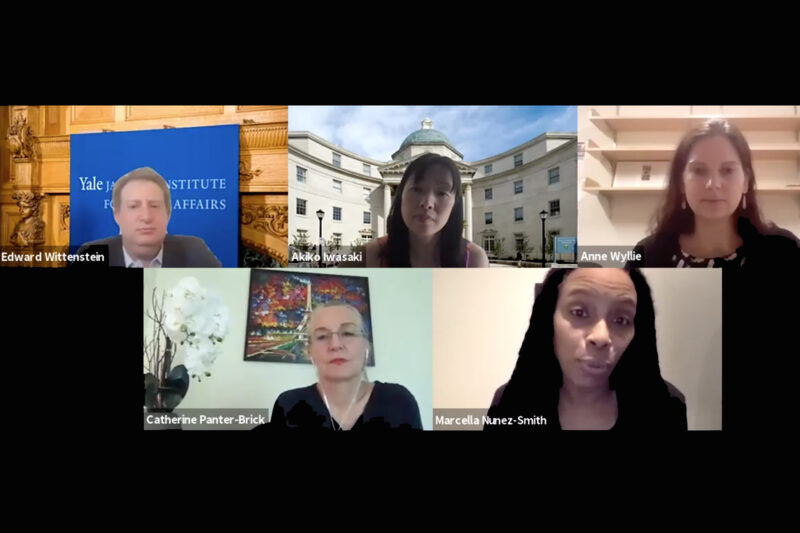Three internationally renowned Yale scientists discussed their latest research findings and clinical observations, part of Jackson’s Virtual Discussion Forum series on COVID-19 and Global Affairs.
Professor Akiko Iwasaki, the Waldemar Von Zedtwitz Professor of Immunobiology and Molecular, Cellular and Developmental Biology; Dr. Marcella Nunez-Smith, Associate Professor of Medicine and Epidemiology, Director, Equity Research and Innovation Center; and Professor Anne Wyllie, Associate Research Scientist in Epidemiology (Microbial Diseases) were the featured speakers during the June 4 event, which was moderated by Catherine Panter-Brick, Bruce A. and Davi-Ellen Chabner Professor of Anthropology, Health, and Global Affairs.
More than 140 attendees tuned in to hear about the latest findings in vaccine development, saliva testing, and antibodies and immunity.
Professor Wyllie, whose lab has done extensive research on saliva testing, described the possibilities and potential benefits of using saliva tests. In addition to being more accurate for detecting COVID-19 infections, saliva testing eliminates the supply chain issues associated with procuring nasopharyngeal swabs and reduces risks to health care workers, who must come in close proximity to patients to administer the nasal swab tests. Saliva collections tubes are also more affordable.
“It could really prove to be really transformative for public health,” Professor Wyllie said.
But validating the research results on saliva testing is crucial, Wyllie explained. “The more data that we can have coming out around the country and around the world, the more people who are confirming it or working together to interpret their results. That’s going to give us all more confidence in what we’re seeing,” she said.
Professor Iwasaki’s lab has also been at the forefront of COVID-19 research, primarily working on understanding immune response to the virus. The key issue, Iwasaki said, is that scientists don’t know yet what level of antibodies are needed for protection from infection by the virus and disease.
“In severe cases of COVID-19, it’s the immune response. The overdrive that appear to cause the actual disease as opposed to early on, the immune response is there to control the virus,” she explained.
“So, we’re able to learn from the patient how immune response is mediated and what kind of immune response is generated in people who developed severe diseases versus those who recover,” Iwasaki said. This understanding of protective immunity is crucial to effective vaccine development.
Dr. Nunez-Smith—who serves as chair of the Community Subcommittee for Governor Lamont’s Reopen Connecticut Advisory Group—outlined the racial and ethnic disparities in COVID-19 mortality.
“These are issues that are pre-pandemic. This is about systematic and intergenerational disinvestment in communities of color where opportunity has been denied,” she said.
Her committee is focused on how the re-opening plans may impact communities of color and other at-risk populations, such as those over 60 and people living in congregate settings like nursing homes and prisons.
Nunez-Smith was also asked to comment on the relationship between science and social action.
“There were many of us who sadly expected to see the disparities and race, ethnicity, that we’re witnessing but for many, and this is a revelation and people did not know how deep and disparate the health opportunity was,” Nunez-Smith said.
“As I see people protesting in the streets, protesting against excessive force and police brutality, what they’re protesting for is an opportunity for good health. So, whether your health is threatened by a virus or it’s threatened by excessive force,” she said. “I think this is how we lend and blend science and social action.”
“I really hope we’re all witness to just a transformative moment in our history where we don’t go back to just the status quo.”
